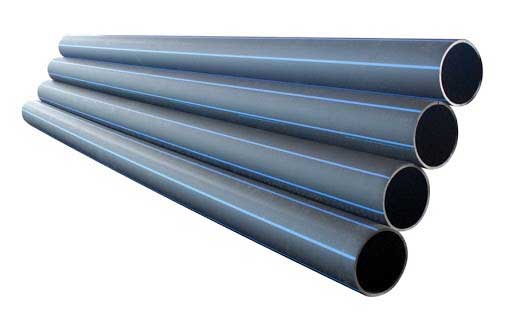The Reliability of Choosing Pipe Supplier American Plastics Midland
Wiki Article
Comprehending the Key Conveniences of HDPE Pipe for Water and Wastewater Management
The use of HDPE pipe in water and wastewater management offers various advantages that warrant factor to consider. Its exceptional durability and lengthy lifespan make it a favored option for numerous jobs. Furthermore, the material's resistance to corrosion and chemical damages boosts its dependability in various settings. The benefits prolong past just long life and resistance. Texas hdpe pipe manufacturer. Exploring its cost-effectiveness and ecological impact discloses a lot more engaging reasons for its widespread fostering in modern-day facilitiesExceptional Toughness and Long Life

HDPE pipe stands apart for its outstanding resilience and long life, making it a recommended choice in water management systems. Built from high-density polyethylene, these pipes can hold up against considerable pressure and stress, guaranteeing dependable performance in time. Their durable nature permits them to endure extreme environmental conditions, consisting of temperature level variations and dirt movements, which can cause various other materials to fail.
The life expectancy of HDPE pipes frequently exceeds half a century, giving a cost-efficient remedy for communities and industries alike. In addition, the product's light-weight buildings streamline installment, minimizing labor prices and durations. This resilience lessens the requirement for constant repairs or substitutes, even more boosting its financial allure.
In water management applications, the integrity of HDPE pipes indicates less disruptions and enhanced solution connection, making them essential to lasting framework development. The mix of resilience and durability strengthens HDPE's function as a cornerstone in effective water management solutions.

Resistance to Deterioration and Chemical Damages
While many products succumb to rust and chemical damages gradually, HDPE pipes display remarkable resistance, making them excellent for numerous water monitoring applications. This strength originates from the molecular structure of high-density polyethylene, which is naturally non-reactive and does not corrode like steels or deteriorate from direct exposure to harsh chemicals. Therefore, HDPE is highly efficient in settings with hostile materials, such as wastewater systems that might include acids, bases, and natural solvents.
Furthermore, HDPE pipelines can withstand ecological factors such as soil level of acidity and saline conditions, additionally improving their suitability for diverse applications (American Plastics HDPE Pipe for Oilfield). Their capacity to keep structural integrity in time minimizes the risk of leaks and failings, which is essential in making sure the safety and integrity of water circulation and wastewater monitoring systems. Subsequently, the resistance to corrosion and chemical damage noticeably contributes to the total effectiveness and longevity of HDPE piping remedies
Cost-Effectiveness and Financial Benefits
When taking into consideration the financial effects of water monitoring systems, the cost-effectiveness of HDPE pipes ends up being obvious. These pipes use lower installment and upkeep expenses contrasted to traditional products like steel or concrete. Their lightweight nature simplifies transportation and setup, resulting in decreased labor costs. Furthermore, HDPE pipelines show a long life-span, frequently surpassing half a century, which converts to less substitutes and long-term financial savings.The resistance of HDPE to rust and chemical damages reduces the requirement for pricey repair work and replacements. The pipes also support efficient water flow, minimizing power prices connected with pumping systems. By alleviating leaks and water loss, HDPE pipelines contribute to substantial financial advantages for districts and industries alike. On the whole, the initial investment in HDPE piping can yield significant economic returns over the lifespan of the water management system, making it a sensible selection for lasting facilities growth.
Ecological Sustainability and Decreased Impact

Versatility and Flexibility in Installation
Due to their distinct residential or commercial properties, HDPE pipes supply exceptional convenience and adaptability in setup, making them appropriate for a wide variety of applications. Their lightweight nature permits simpler handling and transportation, minimizing labor costs and setup time. HDPE pipes can be curved and shaped to fit various surfaces and task requirements, which is specifically valuable in testing settings.In addition, their resistance to corrosion and chemical damage permits setup in diverse settings without the demand for specialized address protective finishes. The capacity to fuse joints develops a continual, leak-free system, enhancing the general honesty and integrity of the installation. HDPE's flexibility also suits ground activity, lowering the threat of damages in areas vulnerable to changing dirt. On the whole, these attributes make HDPE pipelines not only versatile yet additionally a preferred choice for water and wastewater administration systems.
Frequently Asked Concerns
Just How Does HDPE Pipe Compare to PVC in Water Administration Applications?
HDPE pipe offers exceptional flexibility, resistance to deterioration, and sturdiness compared to PVC. Its lighter weight facilitates much easier setup, while its long lifespan reduces replacement expenses, making HDPE a preferred selection in water management applications.What Is the Lifespan of HDPE Water Lines Under Normal Conditions?
Under normal conditions, HDPE pipes can have a life expectancy varying from 50 to 100 years. Their toughness and resistance to corrosion contribute to their long-term efficiency in different applications, making them a reputable option for infrastructure.Are HDPE Piping Recyclable After Their Solution Life?
Yes, HDPE pipelines are recyclable after their life span. hdpe pipe fittings Midland TX. They can be refined and repurposed into brand-new items, substantially decreasing ecological effect and advertising sustainability within the market, making them an environmentally friendly option for piping optionsWhat Is the Installation Process for HDPE Pipes?
The setup procedure for HDPE pipelines includes website prep work, trenching, pipe blend or mechanical joining, directory backfilling, and stress testing. Correct strategies assure a long lasting and effective system for delivering water and wastewater effectively.Can HDPE Water Lines Be Made Use Of for Both Drinkable and Non-Potable Water Equipments?
Yes, HDPE pipes can be used for both potable and non-potable water systems. Their convenience, longevity, and resistance to corrosion make them suitable for various applications, making sure secure and efficient transport of water in different contexts.Report this wiki page